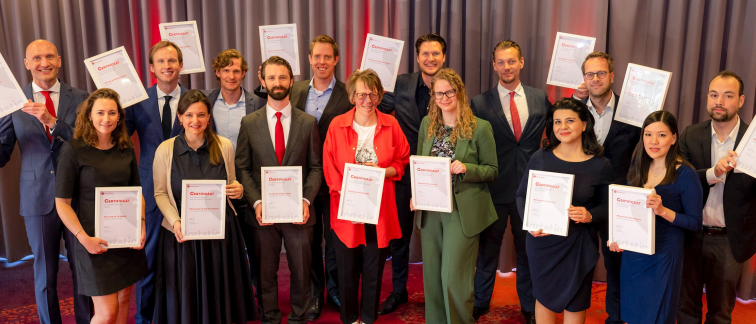Already earlier this year, the Dutch Heart Foundation published the results of four Dekker grants. More recently, the results of the other three Dekker grants were announced, including the Established Investigator grant of Stephan Huveneers. On 23 March 2022, 15 Dekker grants were awarded to top scientists during a festive ceremony, of which 6 went to Amsterdam UMC researchers. In total, the Heart Foundation has awarded 6.2 million euros in this round of Dekker grants. With the grants, the Heart Foundation enables researchers to make the next step in their careers. The Dekker grant helps them to set up and expand their own line of research.
Cure leaky blood vessels
Blood vessels are lined with endothelial cells, which form a tight barrier to prevent leakage. During ageing, blood vessels become stiffer and the barrier formed by the endothelial cells can become leaky: fluid, fats and inflammatory cells can move out of the blood vessels, which can worsen atherosclerosis. With the awarded Established Investigator grant of €700.00, Stephan Huveneers (dept. of Medical Biochemistry) will investigate how these vessels become leaky. He will also simulate vascular stiffening in endothelial cells and stiffened vessels recovered from surgeries. Ultimately, Stephan and his team will test if they can reverse these pathological changes with drugs, to help improve vascular health.
Prevent cardiovascular disease via the diet
While a healthy lifestyle and proper medication can reduce the risk of a cerebral or cardiac infarction, there is still a remaining risk. With the awarded Senior Clinical Scientist grant of €400.000, Nordin Hanssen will investigate if the amino acid tryptophan can be an additional treatment to reduce the risk of an infarction. From previous research, it is known that the amino acid tryptophan is lowered in diabetic and obese patients, but it is unknown why this is the case. Cells can convert tryptophan to an anti-inflammatory substance, and inflammation plays an important role in the process of getting an infarction. Nordin Hanssen will test which form of tryptophan works best against inflammation, using data from large scale population studies. Tryptophan is found in many products such as bananas, and is easy and cheap to produce, making it a promising candidate to prevent infarctions.
Improve acute ischemic stroke treatment
For several years now, specialists have been able to remove the clot from a brain vessel with a catheter after a brain infarction. However, blood flow to the brain often does not completely recover after such an intervention. The blood flow in the smaller arteries is often insufficient, probably because these vessels narrow. With the awarded Postdoc Dekker grant of €270.000, Inge Mulder (dept. of Biomedical Engineering and Physics) will investigate dysfunction in the smaller arteries during occlusion and after the clot has been removed. She will also investigate whether a drug can prevent the small vessels from contracting.
Inhibiting inflammation to combat arteriosclerosis
When you think of arteriosclerosis, you might think mainly of fats, such as cholesterol. But inflammation in the vessel wall also plays an important role in the development of narrowing of our blood vessels. Jeffrey Kroon (dept. Experimental Vascular Medicine) will use the Senior Scientist Dekker grant of €470.000 to study this inflammation. He wants to lay the foundation for new medications against heart and brain infarcts, which can be the result of arteriosclerosis. He will do this by specifically looking at the metabolic processes in the endothelium. This research is also important for other diseases in which inflammation in the blood vessels plays a role, such as infection by COVID-19.
Treating dangerous cardiac arrhythmias with radiation
Many people will be familiar with radiation therapy primarily from cancer treatments. But cardiologist Pieter Postema also expects a beneficial effect in certain heart patients. These are people with a high risk of a dangerous cardiac arrhythmia (ventricular tachycardia), which leads to cardiac arrest. The patients Postema focuses on are living with an internal defibrillator (ICD), but they suffer repeated cardiac arrests. This has an enormous impact on their lives. Postema received the Senior Clinical Scientist Dekker grant of €450.000 to investigate how exactly radiation therapy works for these heart patients. He also wants to know how the radiation can be used safely, without damaging the rest of the heart too much.
Unravelling the cause of hereditary heart muscle disease
Cardiologist and researcher Jan Willem Buikema investigates a specific form of heart failure: dilated cardiomyopathy. In people with this heart disease, the heart muscle cannot contract properly because the cells of the heart muscle do not function well. Therefore, the heart cannot pump blood effectively to the organs. The more affected the heart muscle is, the more serious the health problems, such as fatigue and shortness of breath, become. Buikema received the Senior Clinical Scientist Dekker grant of €360.000 to study the heart muscle cells of these patients. In particular, he will look at the role of a certain protein (betacatenin). He investigates whether you can use this protein to prevent, delay or even repair the deterioration of the heart muscle cells.
About the Dekker grants
The Dekker grants are being awarded for the 35th time this year. They are named after Dr. E. Dekker, former director of the Dutch Heart Foundation. He was the initiator in the Netherlands of civilian assistance in the event of a cardiac arrest. Dekker grants are personalized grants for talented cardiovascular researchers at various stages of their careers.
Faster solutions for patients
Scientific research is desperately needed to prevent people from dying or becoming ill from cardiovascular disease. That's why the Heart Foundation attracts top talent with its personalized Dekker grants and helps them build their own line of research. Many of the studies address topics that have been chosen as key priorities by patients, doctors and scientists. These include, for example, better treatment and lasting cures for cardiac arrhythmias and heart failure. Thanks to the Dekker grants, the search for solutions goes faster, now and in the future.

